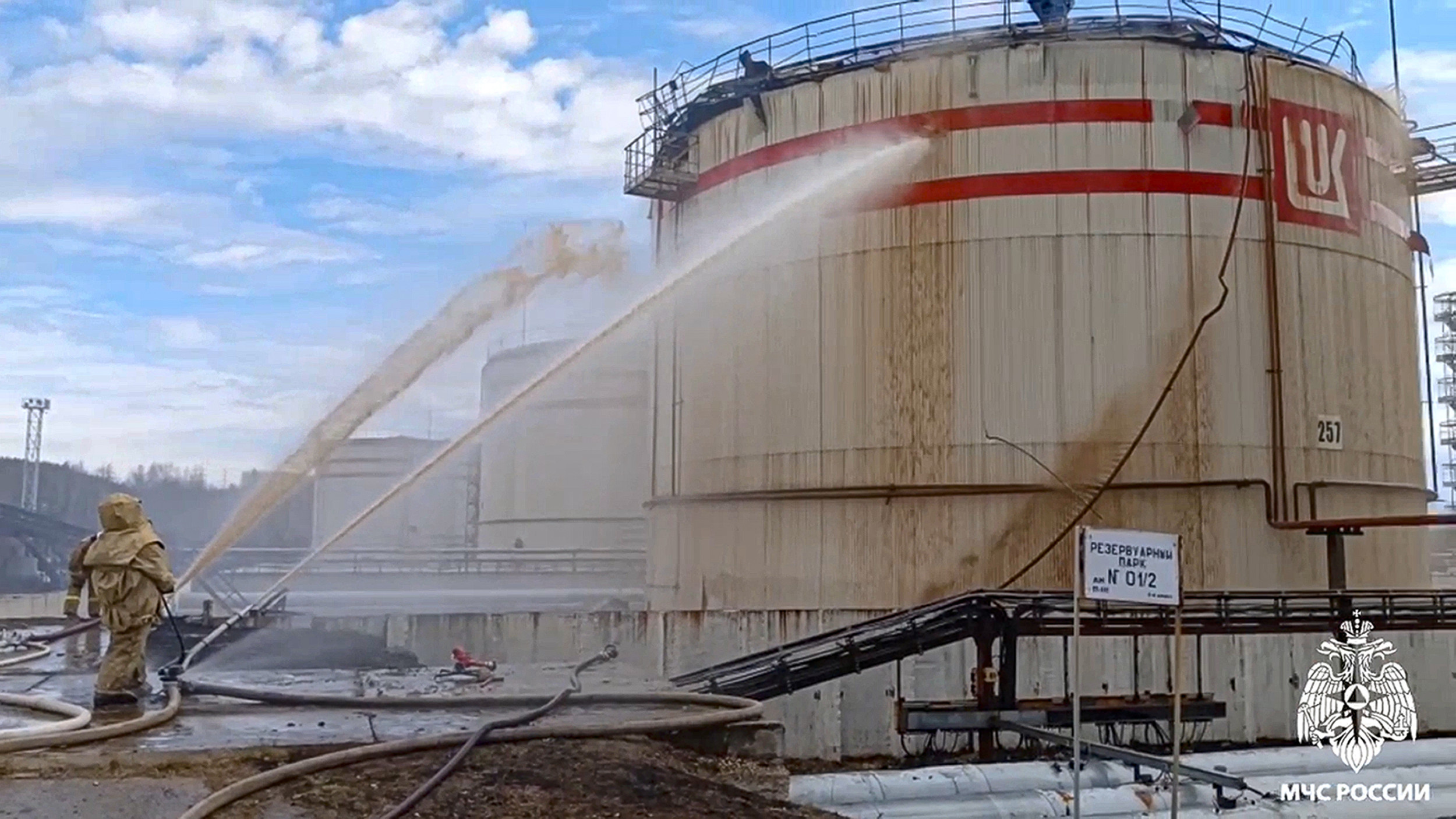Amid the ongoing Russia-Ukraine war, Ukrainian forces are continuing their campaign targeting Russian infrastructure while Kyiv appears to be getting sidelined from peace talks with Moscow and the United States.
Kyiv has recently doubled down on conducting drone strikes on Moscow’s energy and military infrastructure, according to the Institute for the Study of War (ISW).
This development has come as President Donald Trump initiates discussions to end the war with Russian President Vladimir Putin.
Newsweek has reached out to the Ministry of Defense of Ukraine for comment via email outside of business hours.
Why It Matters
One of Ukraine’s key strategies in the war has been targeting Russian energy infrastructure, which funds Moscow’s war effort. Last year, Kyiv performed more than 80 drone attacks on Russian oil refineries and depots and have continued to attempt to injure Russia’s economy, both in terms of war funding and trade, this year.
Reuters’ recent analysis found that due to Ukraine’s attacks and U.S. sanctions, Russia’s oil refining capacity has decreased by 10 percent.
Meanwhile, Kyiv’s continuous strikes on Russian energy and military infrastructure may make peace negotiations more difficult and possibly delay the achievement of an end to the war.
Uncredited, Russian Emergency Ministry Press Service/Associated Press
What To Know
In a report on Russia’s offensive campaign in Ukraine, the ISW, a Washington, D.C.-based think tank, noted on Thursday that Kyiv has continued “to target Russian energy and military infrastructure as part of an ongoing strike campaign against Russian defense industrial enterprises,” citing several attacks on different institutions within the last week.
Ukraine’s Main Military Intelligence Directorate (GUR) announced in a post on Telegram that they destroyed two Valdai radar complexes in Dolgoprudny, Moscow Oblast in drone strikes on the night of February 6 through 7. The GUR said the two complexes were responsible for airspace security over Moscow.
Kyiv also hit the Novolipetsk Metallurgical Plant, Moscow’s largest steel mill located in Lipetsk Oblast, on the night of February 13 in a drone strike, as reported by The Kyiv Independent. The plant produces 20 percent of Russia’s steel. Igor Artamonov, the governor of Lipetsk Oblast, also wrote on Telegram that debris from Ukrainian drones fell on the Lipetsk water aeration station on the same night.
The Security Service of Ukraine also conducted a drone strike and hit Russia’s Andreapol oil pumping station, which is part of the Baltic Pipeline system-2, overnight on February 13, according to the Ukrainian news outlet Suspilne Media. This marks Kyiv’s second attack on the site, with the first occurring on January 29.
These attacks on Russian infrastructure come as Trump initiated discussions to end the Russia-Ukraine war by speaking with Putin on the phone on February 7, although the Kremlin has not confirmed or denied any details about the conversation between the two leaders.
Trump said on Wednesday that he and Putin agreed to “visit each other’s nations” and meet in-person to discuss peace negotiations.
Ukrainian President Volodymyr Zelensky also spoke with Trump on Wednesday.
“I had a long and detailed conversation with President Trump. I appreciate his genuine interest in our shared opportunities and how we can bring about real peace together. We discussed many aspects—diplomatic, military, and economic—and President Trump informed me about what Putin told him. We believe that America’s strength, together with Ukraine and all our partners, is enough to push Russia to peace,” Zelensky wrote in an X, formerly Twitter, post.
Meanwhile, the Ukrainian president will meet with Vice President JD Vance and retired General Keith Kellogg, Trump’s special envoy to Russia and Ukraine, at the Munich Security Conference in Germany this week.
European allies have recently criticized the U.S. for moving forward with peace talks with Russia and appearing to sideline Ukraine, according to PBS Newshour. The representatives for North Atlantic Treaty Organization (NATO) members including the United Kingdom, Lithuania, and Germany demanded that Kyiv have a seat at the table during peace negotiations and have alleged that the U.S. has made concessions to Putin before talks have begun.
What People Are Saying
Roman Sheremeta, an economics professor at Case Western Reserve University, wrote on X in November 2024: “Ukrainian strikes on russian oil refineries are the most effective sanctions! These strikes help burn the oil that fuels Moscow’s war machine.”
Winston Peters, the minister of Foreign Affairs of New Zealand, like European allies, also commented on Ukraine’s participation in peace negotiations and wrote on X on Wednesday: “New Zealand has noted recent comments by the Presidents of Ukraine and the United States. We support Ukraine’s efforts to find a way, working with the United States, to end the war that Russia started. We want to see a just and lasting peace for Ukraine. New Zealand has provided over $130 million of support to Ukraine to date as it defends itself in the face of Russia’s illegal invasion. We will continue to support Ukraine in the future.”
What Happens Next?
Zelensky’s meeting with Vance in Germany will likely influence how further discussions of peace talks go with Russia and the U.S.

